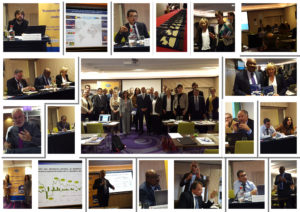Bruxelles, le 23 novembre 2017. La gestion macro-économique entamée par les pays du printemps arabe a donné des résultats mitigés avec quelques progrès réalisés mais plutôt lents et limités. Les participants au lancement du Rapport EUROMED à Bruxelles fournissent leurs analyses, idées et recommandations
La version francaise de cette note sera sera disponible prochainement.
To access this note in pdf, please click here.
To access the full Euromed Report, 2017, click here
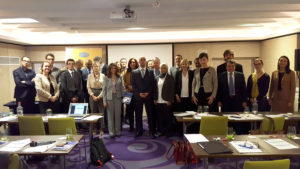
Welcome Speech and Opening Notes
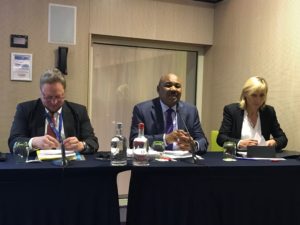
From left to right: Mr. Köhler, Dr. Elbadawi and Prof. Augier
Dr. Ibrahim Elbadawi (President of FEMISE and Managing Director of ERF) initiated the event by providing a brief introduction about FEMISE as a network of 97 of members of research institutes that work to develop development and transition of the south Med countries and monitor the EU-Med Partnership. FEMISE is a partnership between the Economic Research Forum (ERF), Egypt and Institute de la Méditerranée (IM), France. Dr. Elbadawi stressed on FEMISE’s important role of engaging policy makers and spreading knowledge of current regional issues at hand.
Dr. Elbadawi stated the FEMISE Euromed Reports is one of the FEMISE’s sought-after series of publications and it represents the flagship of FEMISE, voicing the South and North common vision for the transition of the Euromed. He explained that this is the first report in this new series, which will be followed by a second report in the first half of 2018 on the private sector development issues, which is currently being handled by IM. He also announced that the third report will be produced towards end of 2018 and will address the issue of conflict and the refugee crisis, which will be handled by ERF.
He thanked the European Commission for providing support for FEMISE since its inception. He addedthat FEMISE policy-relevant research has contributed to built a strong basis for policy dialogues and policy relevant documents and that he hoped that we will continue to receive this support.
Following this introduction he gave a brief background about the authors of the report: Dr. Ahmed Galal (the editor of the report and is the Chairman of the Board of the MENA Health Policy Forum and former ERF Managing Director and former FEMISE President), Dr. Ishac Diwan (visiting professor at Columbia University and holds a chair at Paris Sciences et Lettres), Dr. Zafiris Tzannatos (former professor and chair of the Economics Development at the American University of Beirut), Dr. Hoda Selim (Economist at the IMF), Ms. Jala Youssef (Economist at ERF and FEMISE) and himself.
Dr. Patricia Augier (President of Scientific Committee of FEMISE and IM) complemented the introduction by stating that this event will be an opportunity to contemplate on the research conducted by FEMISE members so far. She said that the FEMISE annual report is a remarkable publication because of its wide distribution and its usefulness for stakeholders interested in economic policies. Dr. Augier emphasizes that the purpose of these reports is to use academic research to inform economic and political policy issues.
“FEMISE has become a benchmark for the political analysis conducted by Mediterranean researchers”, stated Mr. Michael Köhler, Director of DG-South at the DG-Near, at the beginning of his speech. He then addressed the participants with his view regarding the quality of the economic management of the transition in some Mediterranean countries. He emphasized on the negative impact of high unemployment and the insufficient policies to address this problem. He stated that increasing public sector’s jobs is unfavorable and that there is a need to focus more on the private sector and SMEs. He then deplored the lack of regional integration of the Mediterranean countries and their weak integration in the world economy. He expressed his dissatisfaction with the issue, that the source of funding is essentially public, He continued to say that that population growth is putting additional pressure on crucial resources; particularly water resources, job creation and the education system.
Mr. Köhler continued with defining the following priorities: SMEs while stressing that it is considered as the main sources of employment, social security and health system, the education system, and governance of the main demands issued during the Arab Spring by the public. For Mr. Köhler, reporting tools like this one should be used to implement a policy with a clear vision.
Finally, Mr. Michael Köhler points out that societal change is a long-term process and concluded by affirming the EU’s desire to develop the transition between academic research and political decision-making.
Session 1: Southern Mediterranean in transition: What Policy Responses?
The first session saw the presentation of the first three chapters of the Euromed report by their authors: Dr. Ibrahim Elbadawi, Dr. Zafiris Tzannatos and Dr. Ishac Diwan provided each a dimension on how the countries in transition have tackled the challenges they faced following the Arab Spring.
Fig 1: Fiscal deficits, central gov. (% of GDP)
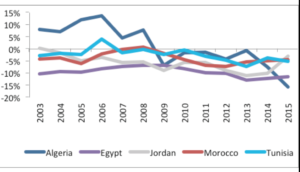 On the macroeconomic front: The fiscal and monetary responses were to introduce expansionary fiscal policy that would address the social pressures: the increased spending in response to social unrests caused serious fiscal imbalances and huge deficits. These have deteriorated current accounts, while growth remains below potential, explained Dr. Elbadawi in his presentation. (To access Dr. Elbadawi presenation, click here).
On the macroeconomic front: The fiscal and monetary responses were to introduce expansionary fiscal policy that would address the social pressures: the increased spending in response to social unrests caused serious fiscal imbalances and huge deficits. These have deteriorated current accounts, while growth remains below potential, explained Dr. Elbadawi in his presentation. (To access Dr. Elbadawi presenation, click here).
Currencies have devaluated in Egypt and Tunisia as a result of short-term views from the central banks by enforcing negative interest rates. The authors highlight the inconsistency of fiscal and monetary policies and stress the need for « rule-based policies ».
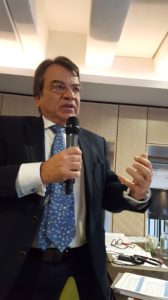
Dr. Tzannatos, former Professor at AUB
The first social responses have been an increase in civil servants’ salaries, an increase in public employment and an increase in subsidies and pensions, which necessitated a reduction in investment in order to finance these expenditures. Dr. Tzannatos pointed out that unemployment negatively affected both, men and women and also young as well as adults. He added that as of 2011, Citizens in Arab countries have had slow increases in incomes and low voice amidst weak Government Accountability (fig 2). To access Dr. Tzannatos full presentation, please click here.
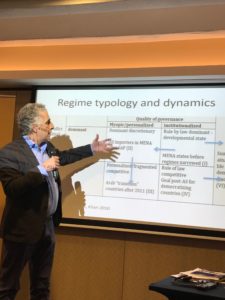
Dr. Diwan, Colombia University
On the political front, Dr. Diwan highlighted three models for a new social contract: a liberal model based on institutions, a model of inclusive liberalism and a social democratic model. A dynamic political system was presented, stressing on the trade-offs between the quality of governments; personalized and institutions, and between liberalized and no-liberalized economies. To acess Dr.Diwan full presenation, please click here.
The authors finally note that the pathways of the Mediterranean countries are different: a form of autocracy in Egypt, attempt of a democratized model in Tunisia, reform of the constitution in Jordan and Morocco with transfer of power to the parliament. The question of the quality of the regional political system remains crucial.
The Discussion Panel of Session 1 made their comments, as follows:
Dr. André Sapir (Professor at Universite Libre de Bruxelles) reflected on the term « Transition » and what is meant by it: a transition from where to what, and through which mechanisms does it take place? He noted that this term may have a different definition in different countries. It was first used for Eastern European countries, and then extended to Russia and other countries of the former Soviet bloc, then to South and East Asia and China.
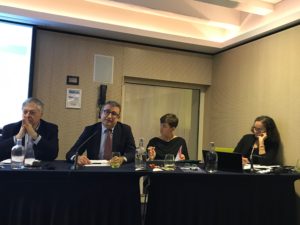
From left to right: Dr. Sapir, Dr. Narbone, Ms. Mingasson and Ms. ElMikkawy
Dr. Sapir then details different transition processes: political; single party to multiparty democracy, economic; socialism to market economy, evolution towards a market economy, and the retention of a one-party regime. For the Mediterranean countries, it is important to understand and to define what is “the transition” for these countries. He suggested that the comparison with the example of the Turkish transition is surely more appropriate for this region.
Dr. Luigi Narbone (Advisor the European External Action Service (EEAS)) started by saying that the region is going through some complex dynamics that the Euromed report has captures very well. He added that the existent conflicts impacting the economic, political and social situations at both the national and regional levels have modified the political economy. He also argued that the impact of the informal sector on the growth of Mediterranean countries is not properly taken into account in the macroeconomic analysis. He also affirms the need for a « push » favoring job creation, dynamism and economic inclusion, protection and social mobility with the objective of a new social contract and resolution of existing social conflicts. Dr. Narbone concluded by outlining the potential role of external actors in creating incentives for internal and external funding.
Ms. Irene Mingasson (Neighbourhood and Enlargement Negotiations (DG-NEAR)) affirmed that the EU has been working with the countries impacted by the arab Spring. She thanked FEMISE for all the outstanding research that has been done so far. She added that the private sector, civil society and academic actors, as stakeholders, need to work with the States to ensure the transition. She contemplated that the acceleration and support for sustainable development must be at the heart of the EU’s attention. Ms. Mingasson then emphasized the importance of investing in structural reforms and to focus more on: boosting trade, development of SMEs, education and skills in line with the needs of the real economy and to direct regional programs to fill gaps in the capacity of countries. She also calls for supporting and strengthening inter-regional trade and developing a comprehensive set of tools for the private sector to function effectively.
She added that the new program on “External Investment Plan” (EIP) can be an opportunity to boost private sector participation in the region. She also mentioned the plans of the EU to reach out to Africa in the forthcoming EU-Africa Summit which will be addressing the issues of: migration, improve social development, to carry out reforms to free the private sector, and to provide technical assistance to ensure market efficiency.
Ms. Mingasson concluded by pointing out that the differences between Mediterranean countries are even more pronounced than between European countries, thus implying different political recommendations for each country. She added that we need to keep in mind a positive vision about the region.
Session 2: Change of course: What Recommendations for the Region?
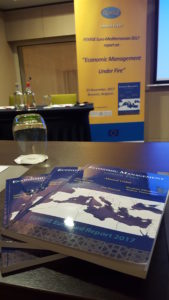 Dr. Ibrahim Elbadawi presented the recommendation chapter of the Euromed report. He started by recalling the difference between sustainable growth and growth with a lack of focus. He noted that social protection measures are needed, but need to be implemented with caution; he reaffirmed the importance of improving social services, especially with regard to health and education. He then highlights the importance of taking into account the interaction between economic reforms and political systems: What type of reform will be accepted by which type of regime? He concluded by recalling the potential role of foreign players in the reformation process.
Dr. Ibrahim Elbadawi presented the recommendation chapter of the Euromed report. He started by recalling the difference between sustainable growth and growth with a lack of focus. He noted that social protection measures are needed, but need to be implemented with caution; he reaffirmed the importance of improving social services, especially with regard to health and education. He then highlights the importance of taking into account the interaction between economic reforms and political systems: What type of reform will be accepted by which type of regime? He concluded by recalling the potential role of foreign players in the reformation process.
Dr. Noha ElMikawy (Ford Foundation Middle East and North Africa) introduced her speech by saying that one needs to keep in mind three main concepts: 1- quality of the State, 2- the quality of the Society and 3- the issue of external actors. She added that the world is undergoing a profound transformation, with States built to represent the general interest. Crises thus result from the inability of States to achieve the goals of public interest.
First, in terms of the State, Dr. ElMikawy noted that the responses to the crises are not optimal, as they aim to stabilize the economy but do not address the sources of crises; she suggested inclusive investment that is not restricted to infrastructure as it is currently. Second in terms of the society, she stressed that the political voice from uninformed civil society or that of blinded populism could have negative consequences. Hence civil society need to be better informed and have a respectful political framework, to guarantee the variety of parties.
Third, regarding external actors, she highlights the problem of Mediterranean countries’ confidence in partnerships with the EU; She recalls, for example, that the IMF and World Bank plans have a short-term vision, that the Gulf Cooperation Council remains a partner that does not systematically attach importance to social inclusion, and that, for China’s interventions, trade issues have the upper hand on a more social and sustainable vision.
Ms. Ingrid Schwaiger (Neighbouhood and Enlargement Negotiations (DG-NEAR)) highlights the regional aspects of the Southern Neighborhood and stresses that, beyond the macroeconomic aspect, policies must promote economic growth and job creation; she proposes an approach built on existing analysis with emphasis on flexibility and differentiation for each country, even within regional cooperation. Ms. Schwaiger also proposes a framework with a regional platform occupied by the Union for the Mediterranean, working groups and inter-ministerial meetings to identify priorities, a bilateral sectorial dialogue, and a differentiated approach to trade relations.
Ms. Schwaiger then presented the European Neighborhood Policy (ENP) and its overall objective of developing the private sector, the main source of sustainable job creation. She then details the specific dimensions and objectives of the ENP: human capital and skills, competitiveness of SMEs and their environment, causes of migration, innovation, and inclusion of non-governmental actors as stakeholders. She mentioned the role of Blending with other financial institutions and particulairy the new program on “Enteral Investment Plan”.
She then listed six important economic dimensions that need to be addressed: Stabilizing the macroeconomic environment, boosting trade and investment, providing enabling environment for SMEs and innovation policy, enhancing Human capital and skills, inclusive growth and addressing the root causes of migration and expanding access to finance. She added that there is emerging a new phenomenon which is the social business/enterprises.
Finally, she advised to develop links with other networks to support research on political and economic issues, with key topics like innovation, inclusive economic growth, regional integration and the development of inclusive economic models for development like the social business model. Dr. Schwaiger also reaffirms the need of the inclusiveness of sub-Saharan Africa on these issues.
Dr. Christos Kourtelis (Antalya Bilim University) regrets that before 2011 the EU supported autocratic leaders while advocating the importance of democracy. He then focuses on the topic of rural poverty and presents support for small farms with the objective of integrated and decentralized rural development, which is organized into agricultural associations and where civil society organizations occupy a fundamental position.
Dr. Kourtelis reports the unintended consequences of centralized programs: farmers excluded from programs abandon the exploitation of certain types of cereals. He then highlighted the need to use local institutions and authorities in decision-making. He highlights the opposition between a national specialty grain plan and lower market value local varieties grown using local methods. Dr. Kourtelis warns, however, that decentralization is not enough on its own, and that it is necessary to take into account the disruption of local products.
The Discussion Panel of Session 1 made their comments, as follows:
Dr. Abla Abdel-Latif (Executive Director Egyptian Center for Economic Studies) first notes that the management of the economy comes in a context of external pressures. She recalled that in Egypt, the country has been going through a period of transition since 2011. On the economic front, and before the IMF plans, economic management took the form of investment in road infrastructure and electricity projects, loans to SMEs, along with strengthening of civil society. After the implementation of IMF plans, new measures were implemented like privatization and efforts on inclusion of related stakeholders.
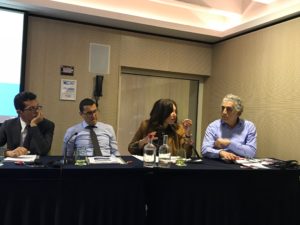
From left to right: Dr. Ekadhi, Dr. Aderkaoui, Dr. Abdel-Latif and Dr. Diwan
Dr. Abdel Latif then presented some economic dynamics, focusing on the Egyptian economy: a drop of 1% of unemployment, escalation of inflation up to 33%, growth of FDI by 14%, decrease in domestic debt but increase in foreign debt. She emphasizes that many of the large scale projects are led by the army, this situation is transitory as it meets the needs in the short term especially for infrastructure, to ensure continuity. Dr. Abdel-Latif also added that the subsidies have been reduced, and that the institutional reform to ensure better governance should allow a reduction in corruption and financial losses that it generates. It reaffirms the need to restore trust between the government and the private sector, and to invest in education with a goal of full social justice. She concluded by saying despite these reforms, there are still a lot to be done and that the progress is slow. There is a need for a better coordination between the ministries to ensure the efforts are going in the right direction. The problem of education need to be addressed urgently and more investment towards this sector and the health sector is needed.
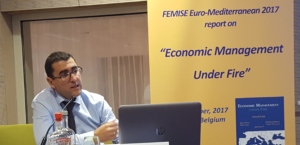
Dr. Mouncif Aderkaoui (Director of studies and financial forecast, Ministry of economy and finance of Morocco)
Dr. Mouncif Aderkaoui (Director of studies and financial forecast at the at Ministry of economy and finance of Morocco) stated that he found the contents of the Euromed report very enlightening and interesting. He highlighted the problem of the statistical data used that could be updated. He pointed out that oil prices strongly affect the macroeconomic situation of the Mediterranean countries, and that they are strongly connected to the EU, particularly for exports, tourism and raw materials. Dr. Aderkaoui also pointed out that Morocco has deepened its links with sub-Saharan Africa and it is directly affected by the conflicts that take place there. He then presented the macroeconomic situation in Morocco and highlighted the expansionary fiscal policy that was put in place in response to the 2011 crisis. It recalls that Moroccan growth remains supported by a relatively strong domestic demand and diversified exports and high added value of the automotive sector, debt has risen but has stabilized and its reduction is expected by 2020, He also informed us that FDI is on the rise.
Dr. Aderkaoui justifies this relatively encouraging situation by two factors. On the political front, the change of constitution in 2011 and the reforms made it possible to transfer part of the powers of the King to the Parliament. On the economic front, Morocco has not cut public investment, and has only been indebted to support investment projects, particularly to diversify the economy; in terms of product and geographic diversification. Dr. Aderkaoui also notes that exports to Africa have doubled, while exports to Europe have decreased, and that Morocco is developing South-South partnerships. He also recalls the existence of an investment plan for the industry.
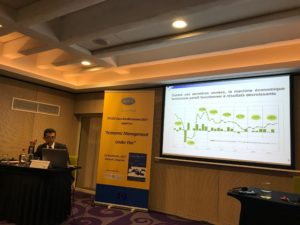
Dr. Zouhair Elkadhi (Tunisian Institute for Competitiveness and Quantitative Studies)
Dr. Aderkaoui finally presents the main challenges facing Morocco: the increase in youth unemployment, the inclusion of women, education, and territorial inclusion. He proposes some ways to respond to this, such as the introduction of a progressive tax on businesses and the desire to integrate civil society into public policy development.
Dr. Zouhair Elkadhi (Tunisian Institute for Competitiveness and Quantitative Studies) begins by recalling that the Tunisian economy has been on a slow down since the revolution in 2011, which was coupled with the global economic slowdown and the war in the neighboring country Libya. He points to the growth problem, a previous trade deficit which has worsened, an internal demand problem, and the fall of non-market sectors such as the tourism sector following the attacks, a drop in private investment and exports, and rising unemployment. Demand-side stimulus policies have increased the tax burden. He added that the government is taking measure for the deficit to stay below 5% versus 6% today.
On a positive note, he added that Tunisia has a strong civil society and a political system that could prevents major crisis. Dr. Elkadhi then details the reforms led by Tunisia: independence of the Central Bank, law on renewable energies, law on public-private partnerships (PPPs) to allow more financing capacity for projects, tax reform; the tax is currently the lowest of the Region, civil service reform; reduction of the wage bill and pension reform. Finally, he emphasized that there are no more margins on the demand side and that the next stimulus policies must be on the supply side.
Open Disccusion
Dr. Mouncif Aderkaoui stated that tariff opening in Morocco has had no global effect, only the sectors already exporting have gained competitiveness. He regretted a lack of support and cross-cutting policies, particularly concerning innovation, education and exchange rate. He emphasizes that Morocco has been in deficit on all signed free trade agreements, which in fact benefit multinationals.
Dr. Abla Abdel-Latif pointed out that because of the fall in touristic revenues, Egypt has defined manufacturing and agriculture as strategic sectors. It also recalls that the take-off of the private sector took place in 2003 and that it is still active. Dr. Abdel-Latif finally mentioned that the army’s « Build and Transfer » strategy towards the private sector was important at this stage to move the economy (cutting bureaucracy).
Dr. Zouhair Elkadhi recalled that Tunisia is a promising democratic model, that a Nobel Peace Prize has been awarded to its union and employer centers, and that a process of decentralization is in progress.
A final remark, states the importance of having institutions and policies with a regulated basis as well as the relevance of an evaluation of tax policies by an external commission.
Session 3: Managing the Transition of Souh Mediterranean countries
This session introduced a number of FEMISE projects that have been undertaken on macroeconomic management and the transition of the South Med countries.
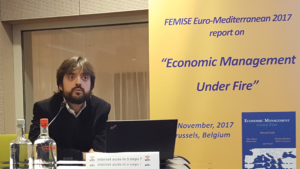
Dr. Thomas Lagorde-Segot (Kedge Business School)
The first project (FEM43-06) was presented by Dr. Thomas Lagorde-Segot (Kedge Business School) on “Twin deficits and the sustainability of macroeconomic policies.” This project deals with economic management in emergency situations. (The full report is available online by clicking here)
Dr. Lagorde-Segot advocated fiscal consolidation for Southern countries in parallel with a tax expansion of the countries of the North. He also notes that the debt of MENA and Southern European countries is generally sustainable thanks to austerity policies, and that competitiveness remains a fundamental problem for the Region. Finally, he suggests replacing macroeconomic policies with structural policies, with financial targeting to improve competitiveness.
 Dr. Doaa Salman (Professor Modern Sciences and Arts University (MSA)) presents the second FEMISE project (FEM42-07) on “External and Internal imbalances in South Mediterranean countries : Challenges and Costs” (report under publication). She began by presenting the fundamental pressures and threats and the macroeconomic environment, notably the determinants of indebtedness and the implication of a high debt on growth, investment, interest rates. Dr. Salman recalled that the South Med countries are witnessing deterioration in the current accounts and the trade balances since the mid-2000s, however these deficits have now stabilized. They are also witnessing deteriorating positions on the Net Foreign Assets. Dr. Salman also emphasized that the inability to adopt a realistic policy accelerates deterioration and macroeconomic imbalances. Dr. Salman goes on to say that tax consolidation is not urgent, and that policy makers should be more interested in tax symptoms, as austerity policies are socially very expensive.
Dr. Doaa Salman (Professor Modern Sciences and Arts University (MSA)) presents the second FEMISE project (FEM42-07) on “External and Internal imbalances in South Mediterranean countries : Challenges and Costs” (report under publication). She began by presenting the fundamental pressures and threats and the macroeconomic environment, notably the determinants of indebtedness and the implication of a high debt on growth, investment, interest rates. Dr. Salman recalled that the South Med countries are witnessing deterioration in the current accounts and the trade balances since the mid-2000s, however these deficits have now stabilized. They are also witnessing deteriorating positions on the Net Foreign Assets. Dr. Salman also emphasized that the inability to adopt a realistic policy accelerates deterioration and macroeconomic imbalances. Dr. Salman goes on to say that tax consolidation is not urgent, and that policy makers should be more interested in tax symptoms, as austerity policies are socially very expensive.
Discussion:
Dr. Mongi Boughzala (Professor University of Tunis El-Manar) started his comments by emphasizing the strong tax pressures that the Mediterranean countries are undergoing, which are forced to carry out fiscal consolidation policies that could negatively affect growth. He also recalled the difficulty of macroeconomic stabilization while restoring growth. Dr. Boughzala suggested dividing the article by Dr. Thomas Lagorde-Segot in two sections: a section to address the MENA countries and the other for South-European countries. He suggested to take into account the period before and after 2011, especially for Egypt and Tunisia, to better analyze the situation. He recalls that the economic situation has evolved, with relative stability and a reduction of the debt between 1990 and 2010, then an increase in deficits and debt since 2010. Dr. Boughzala also poses the problem of grouping very different countries and he considers that taking account of historical data is necessary.
Dr. Gilles Dufrenot (Professor Aix-Marseille University) also underlined the diversity of Mediterranean countries, and the difficulty of grouping together. He believes that a separation between producing and oil-importing countries would be more relevant. Dr. Dufrenot suggested a research topic that evokes the question of the optimal interest rate so that a country can enter into debt in a sustainable way. Finally, he noted that some countries, such as Morocco and Egypt, have better access to international capital, requiring different conceptual frameworks for debt sustainability.
Floor discussion evolved around the gap between savings and investment and the need for an economic analysis of total available savings posing the question of savings as a tool of economic policy or its use in creating incentives. A clarification is made on saving investments that it is generally made in low-risk products such as real estate.
Finally, the question was raised about the arbitrage between a fixed exchange rate and the control of inflation.
Round Table: Towards the EU-MED research agenda on transition:
Dr. Sergio Alessandrini (Professor, Modena University, Italy) opened the last session by saying that FEMISE is on the right track in terms of catching the important and relevant research questions and that the focus of this session is to look into new research topics.
Mr. Santiago Loranca Garcia (Head of Unit DG- ECfin – Neighbourhood Countries – Macro-Financial Assistance) started his intervention by putting forward four key words: « Strong Sustainable Inclusive Growth ». Based on these terms he highlighted some important research questions that could be interesting to investigate as follows: what perspectives for a long-term growth. Also, while looking at countries’ deficits to look also into the quality of public finance, what is the composites of revenues and expenditures and how effective these are (Fiscal Governance ) and questions related to the independence of institutions; the idea of a « growth friendly fiscal consolidation » and where to find the financial resources to maintain sufficient investment and social spending. Another issue is related to the role of the private sector in the sustainable growth process and the need for a good business environment and efficient markets. A third topic was related to the risk of lending and links to reforms to governance and business climate and structural reforms. The view of the populations concerning inequalities and injustices was also highlighted. Finally, the role of the private sector in the sustainable growth process was reaffirmed, highlighting the need for a good business environment and finding ways to improve it.
Dr. Abla Abdel-Latif recalls that solving macroeconomic problems is not enough to solve political problems. She separated between long term, medium and short term research agenda. For the long term, she advises to look at the rapid evolution of technologies and the loss of jobs, especially in manufacturing. In the medium term, she proposes to study the issues of civil and digital protection. In the short term, she believes that the priorities should be the drivers of change, especially with regard to institutional reforms, improvement of governance and the need to improve the relation between private, government and population; the social justice needs to be considered an in integral part of the economic policy (creating jobs, equal rights, rural areas, ..etc); the role of the civil society needs to be better defined and how to promote it. In terms of external relations, she suggested looking into bottlenecks of regional cooperation such as Agadir (here she stated that the problem of this agreement that members are producing the same goods so there is a need to diversify); the need to emphasize the role of value chains and the role of services..
Dr. Mouncif Aderkaoui recalls that emergency solutions that were used did not solve the underlying problems. He then makes suggestions to the subjects for future research. First, he suggests focusing on consolidating macroeconomic stabilization, growth inequality issues and job growth causality. On this issue, he regrets that growth has not created enough jobs, and recalls that fiscal adjustment has had an impact on inequalities and employment. Second, he calls to study the fiscal potential in terms of fiscal space. Third, he suggested more in-depth research that tackles the youth employment and the potential of SMEs to create jobs. A fourth suggestion was to include the socially excluded groups in any research: young people, women, rural population. Fifth, he underlines the lack of coherence of the mechanisms, and suggests studying the case of Sweden and its minimum base of social rights. Seventh, he proposes an evaluation of public policies on climate. He also points out that the new constitutions pose the problem of moving from their conception to execution. Finally he calls for a rapprochement with sub-Saharan Africa.
Open Discussion
Participants made comments highlighting the difficulty of reconciling a fiscal consolidation policy with the maintenance of sufficient growth. The pressures facing the Mediterranean countries also point to the need for inclusive growth to meet the aspirations of their populations; creation of sustainable jobs, establishment of social protection and health systems, access to an educational system of quality and the participation of civil society.
As the Mediterranean Region is particularly vulnerable to climate change and natural resource management problems, participants stressed the need to make the environmental dimension one of the priorities of the discussions and policies to be implemented. In addition, the regional integration of the Mediterranean countries, while putting into accounts their diversity. It was also demanded for this region to be able to influence the global economy. Extensive collaboration with sub-Saharan Africa is also suggested in order to respond to common issues in Europe, the Mediterranean and Africa.
Finally, the usefulness of academic research in feeding policy decisions is underlined.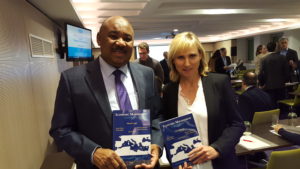
Dr. Augier closed the event and thanked the speakers for their valuable knowledge and recommendations towards the policy making the region. She also thanked the participants for the very constructive dialogue and interactions.
